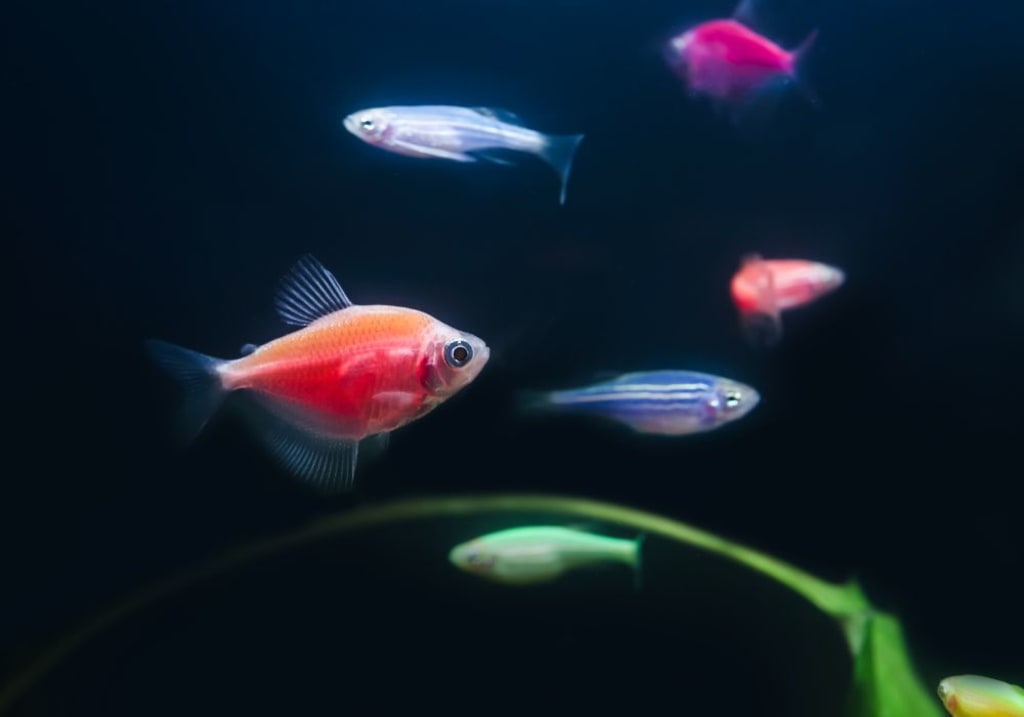A Beginner's Guide to Caring for Freshwater Fish
5 Essential Tips

Introduction to Freshwater Fish Care
Aquariums have been a popular source of entertainment and relaxation since the 1800s. But taking care of freshwater fish is not as simple as it seems. Without proper knowledge, your tank can easily become filled with unhealthy fish, making the experience both frustrating and disheartening. This beginner's guide to freshwater fish care provides five essential tips to help get you started. The first essential tip for freshwater fish care is to research the type of fish you are planning on introducing into your tank. Not all types of fish can live in harmony, so it’s important that you understand their individual needs before adding them to the aquarium.
Some things to consider are the size of the tank, what type of substrate and rocks they prefer, and what type of diet they need. Second, maintain healthy water conditions. Good water quality is critical for keeping your aquatic companions happy and healthy. To do this, test your aquarium regularly for ammonia levels and adjust accordingly by adding a bacteria supplement or changing out some of the old water with fresh de-chlorinated water. Additionally, keep an eye out for signs of illness such as cloudy eyes or white spots on their scales, which may indicate parasites or other illnesses that require treatment right away. Thirdly, keep track of your aquarium maintenance schedule.
Routine care such as cleaning filters and changing out old water is necessary for maintaining a healthy environment in the tank. Additionally, regular checkups should be done on all feeders and decorations in order to make sure they are not becoming too cluttered or unclean—a great way to keep things running smoothly! Fourthly, provide plenty of hiding places in your aquarium—this will help reduce stress levels in your aquatic friends by giving them places to escape from light or potential predators when needed. Hiding places can also help create natural territories for certain fishes providing them with more comfort and security while swimming around in their new environment.
Lastly, make sure you are feeding your aquatic friends an appropriate diet with enough nutrients that they need to stay healthy and active! A good rule of thumb is to feed them small amounts several times a day rather than one large meal—this helps prevent excess waste being produced in the tank which can lead to poor water quality over time.
Essential Equipment for Freshwater Fish Care
When it comes to freshwater fish care, having the right equipment is essential. It can help ensure that your tank is properly maintained and your fish are healthy. Here are five essential pieces of equipment you should have on hand when caring for your freshwater fish:
Aquarium Tank: An aquarium tank is the most basic piece of equipment needed to house your freshwater fish. Choose a tank size that suits the size and number of fish you plan to keep, and make sure the tank is equipped with a filter system to keep the water clean.
Fish Net: A fish net will come in handy for scooping up debris and waste from the bottom of the tank as well as catching any fish that may need to be moved or removed from your tank.
Aquarium Gravel: Aquarium gravel helps keep water clean by trapping dirt particles. It also gives your aquarium a more naturalistic look, as well as providing an anchor for live plants.
Aquarium Heater: In order for your freshwater fish to thrive, you’ll need an aquarium heater to maintain consistent temperatures in their environment. Choose one that’s appropriate for the size of your tank.
Test Kits: Test kits are a must if you want to keep track of water parameters such as pH level and ammonia levels in order to make sure they stay within a safe range for your fish.
These five pieces of equipment form the foundation of any successful freshwater aquarium. By ensuring that you have all these items on hand, you can rest assured knowing that your tank is properly maintained and well-equipped for success!
Establishing a Balanced Aquarium Environment
When caring for freshwater fish, it is essential to create and maintain a balanced aquarium environment. Freshwater fish care tips should include steps to properly cycled the tank, selecting compatible fish, monitoring water parameters, and changing the water regularly.
Cycle the Tank
Freshwater fish care tips should include a guide for cycling the tank. This process involves allowing beneficial bacteria to grow in order to convert dangerous waste products from the fish into less harmful substances. The cycle can take up to four weeks to complete and requires regularly testing water parameters such as pH, ammonia, nitrite, and nitrate concentrations.
Choose Compatible Fish
In addition to cycling the tank, freshwater fish care tips should also focus on selecting compatible species of fish. Different types of fish have varying needs in terms of swimming space, food preferences, water temperature and pH levels. Therefore it is important to research each species before adding them to a tank together. It is also essential not to overcrowd the tank with too many fish as this can increase stress among individuals as well as increasing levels of toxins in the water.
Monitor Water Parameters
When caring for freshwater fish, it is very important to monitor water parameters regularly. This includes checking ammonia, nitrite and nitrate levels (which are all by-products from fish waste) as well as pH levels (the degree of alkalinity or acidity). If these parameters fall out of balance it can be toxic for your fish resulting in health issues or death. Regular changes of 25-50% of aquarium water can help keep these levels in check while also removing excess waste products from the tank.
Change Water Regularly
It is also essential that freshwater fish care tips include a guide on changing water regularly which will help keep your aquarium clean and healthy for your inhabitants. Depending on the number of inhabitants you may need to change up 25-50% percent weekly or biweekly as well as topping off evaporated water with dechlorinated tap or bottled spring water between changes. In conclusion, when beginning in caring for freshwater fish it is important that a balanced aquarium environment is established first by cycling the tank and choosing compatible species followed by regular monitoring of water parameters and changing aquarium water at least weekly or biweekly.
Feeding and Maintaining Healthy Water Conditions
Caring for freshwater fish can be daunting for a beginner, however, there are some tips to make it easier. Freshwater fish care tips are essential in creating a healthy environment for your fish. To ensure that your fish flourish, here are 5 essential tips to help you get started.
Tip 1: Monitor Water Quality
Water quality is one of the most important factors for the health of your freshwater fish. This means that you must regularly test the water for temperature, pH balance, ammonia, nitrate and nitrite levels. If any of these levels become too high or too low, it will be unsafe for your fish and can make them ill or worse. If the water quality is not ideal, use a water conditioner to adjust the levels so they are safe for your fish.
Tip 2: Regulate Temperature
Fish require regulated temperatures to survive in their tank. The temperature should typically stay within 76°F and 82°F (25°C to 28°C). It's important to ensure that the temperature stays consistent as sudden fluctuations can shock the fish and have a negative impact on their health.
Tip 3: Establish a Feeding Schedule
Creating regular feeding schedules is vital in providing your freshwater fish with vital nutrients they need to remain healthy. A good rule of thumb is to feed them once or twice a day but only enough food that they can consume within two minutes. Overfeeding can lead to water pollution which causes poor water quality and could result in illness or death of your fish.
Tip 4: Change Tank Water Regularly
You should do partial water changes between 10% and 30% per week depending on how many fishes you have in your tank as well as what type of filtration system you use. This helps keep the water clean by getting rid of accumulated waste and leftover food particles.
Tip 5: Add Aquatic Plants
Adding aquatic plants will not only create an aesthetically pleasing environment but also provide oxygenation which helps keep the tank livable. Plus, it also gives your fishes places to hide if they feel threatened or stressed out from other fishes in the tank.
Common Mistakes to Avoid When Caring for Freshwater Fish
Caring for freshwater fish is no easy task, but with the right guidance and tips it can certainly be done with success. As a beginner, it's important to make sure that you are well informed of the common mistakes that should be avoided when caring for freshwater fish. Here are 5 essential tips to help beginners care for their freshwater fish in the best way possible:
1. Improper Water Conditions: The biggest mistake beginner aquarists make is not taking into account the proper water conditions needed for their fish. It's important to do a full water test every month and adjust accordingly if necessary. This includes monitoring ammonia, nitrates, pH levels and temperature as these can all have an impact on the health of your fish.
2. Overcrowding: Another common issue is overcrowding your tank by adding too many fish at once or not properly monitoring their growth rate. To avoid this mistake, research how much space each species needs and ensure that you're providing adequate room in your tank.
3. Poor Maintenance: Regular maintenance of your tank is essential when it comes to providing a healthy environment for your fish. This includes cleaning out any debris or algae from the tank walls as well as making sure that you are changing out water at least once every two weeks.
4. Unsuitable Diet: What you feed your fish plays a crucial role in their overall health and wellbeing so it’s important to make sure they are receiving a balanced diet that suits their species’ needs. Research what type of food each species requires and ensure that you are providing them with the right mix of proteins, vitamins and minerals.
About the Creator
Hasan
Welcome...
In this site of mine you can learn amazing things and many information that you don't know so please subscribe to my site.
Enjoyed the story? Support the Creator.
Subscribe for free to receive all their stories in your feed. You could also pledge your support or give them a one-off tip, letting them know you appreciate their work.






Comments
There are no comments for this story
Be the first to respond and start the conversation.